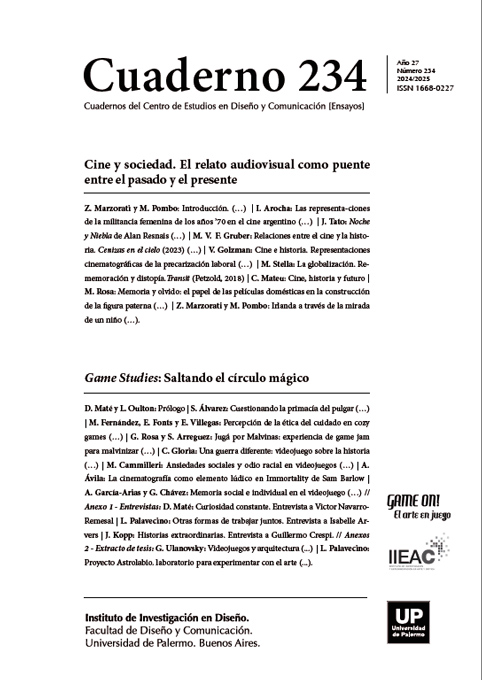Extracto de tesis Videojuegos y arquitectura. (1995-2021). Un estado de la discusión
Résumé
En la década de 1990, el concepto de ciberespacio despertó fantasías de inmersión en una serie de arquitectos que detectaron, en el desenfoque del límite entre esa metáfora espacial y su espacialidad concreta, una oportunidad de práctica inédita.
Références
Borries, F., Walz, S. y Böttger, M. (2007) Space Time Play: Computer Games, Architecture and Urbanism: The Next Level. Springer Science & Business Media.
Flanagan, M. (2003) SIMple & Personal: Domestic Space & The Sims. Proceedings of the Melbourne DAC. http://hypertext.rmit.edu.au/dac/papers/Flanagan.pdf
Flanagan, M. (2009) Critical Play: Radical Game Design. MIT Press.
Feireiss, L. (2007) New Babylon Reloaded. Learning from the Ludic City. Borries, F., Walz, S. y Böttger, M. (eds.) Space Time Play: Computer Games, Architecture and Urbanism: The Next Level. Springer Science & Business Media.
Holopainen, J. y Björk, S. (2007) Design Patterns are dead. Long Live Design Patterns. Borries, F., Walz, S. y Böttger, M. (eds.) Space Time Play: Computer Games, Architecture and Urbanism: The Next Level. Springer Science & Business Media.
Hovestadt, L.. (2007) Why Games for Architecture? Borries, F., Walz, S. y Böttger, M. (eds.) Space Time Play: Computer Games, Architecture and Urbanism: The Next Level. Springer Science & Business Media.
Jenkins, H. y Fuller, M. (1995) Nintendo® and New World Travel Writing: A Dialogue. Jones, S. (ed.) CyberSociety: Computer-Mediated Communication and Community. 57-72.
Jenkins, H. (2002) Game Design as Narrative Architecture. Computer, 44. 118-130. Kelly, K. (1 de enero de 1994) Will Wright: The Mayor of SimCity. Wired. https://www.wired.com/1994/01/wright/
Kirkland, E. (2009) Horror Videogames and the Uncanny. Proceedings of DiGRA 2009. http://www.digra.org/digital-library/publications/horrorvideogames-and-the-uncanny/
Lobo, D. (2007) Playing with Urban Life: How SimCity Influences Planning Culture. Borries, F., Walz, S. y Böttger, M. (eds.) Space Time Play: Computer Games, Architecture and Urbanism: The Next Level. Springer Science & Business Media.
Maas, W. (2007) Spacefighter. A Game for the Evolutionary City. Borries, F., Walz, S. y Böttger, M. (eds.) Space Time Play: Computer Games, Architecture and Urbanism: The Next Level. Springer Science & Business Media
Magnet, S. (2006) Playing at Colonization: Interpreting Imaginary Landscapes in the Video Game Tropico. Journal of Communication Inquiry, (30)2. 142-62. https://doi.org/10.1177/0196859905285320
Manovich, L: (2001) The Language of New Media. MIT Press.
Mitchell, W. (1995) Soft Cities. Architectural Design, 118. 8-13.
Murray, J. (1997) Hamlet on the Holodeck. The Future of Narrative in Cyberspace. MIT Press.
Nitsche, M. (2008) Video Game Spaces: Image, Play, and Structure in 3D Worlds. MIT Press.
Novak, M. (1991) Liquid architectures in cyberspace. Benedikt, M. (ed.). Cyberspace: first steps. MIT Press. 225-254
Pearce, M. y Spiller, N. (1995) Architects in Cyberspace. Architectural Design, 118.
Saggio, A. (2007) The New Mental Landscape. Why Games are Important for Architecture. Borries, F., Walz, S. y Böttger, M. (eds.) Space Time Play: Computer Games, Architecture and Urbanism: The Next Level. Springer Science & Business Media.
Schell, J. (2007) “Can I Teleport Around?”. Borries, F., Walz, S. y Böttger, M. (eds.) Space Time Play: Computer Games, Architecture and Urbanism: The Next Level. Springer Science & Business Media.
Vrachliotis, G. (2007) Game of Life. On Architecture, Complexity and the Concept of Nature as a Game. Borries, F., Walz, S. y Böttger, M. (eds.) Space Time Play: Computer Games, Architecture and Urbanism: The Next Level. Springer Science & Business Media.
Walz, S. (2010) Toward a Ludic Architecture: The Space of Play and Games. ETC Press.
Wolf, M. J. P. (2002) The Medium of the Video Game. University of Texas Press.
Los autores/as que publiquen en esta revista ceden los derechos de autor y de publicación a "Cuadernos del Centro de Estudios de Diseño y Comunicación", Aceptando el registro de su trabajo bajo una licencia de atribución de Creative Commons, que permite a terceros utilizar lo publicado siempre que de el crédito pertinente a los autores y a esta revista.


